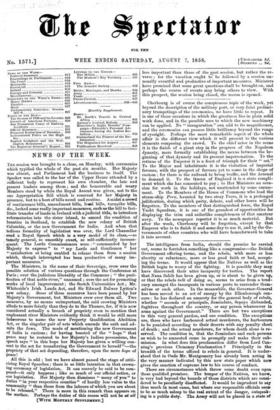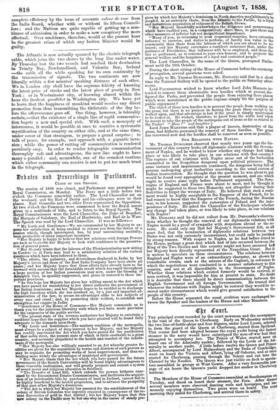NEWS OF THE WEEK.
Tee session was brought to a close, on Monday, with ceremonies which typified the whole of the past six months. Her Majesty was absent, and Parliament had the business to itself. The Speaker was called to the bar of the Upper House attended by a sufficient body to represent his own chamber, the late and present leaders among them ; and the honourable and weary Members stood by while the Royal Assent was given, not to the one Appropriation Bill which is reserved for her Majesty in presence, but to a host of bills novel and routine. Amidst a crowd of continuance bills amendment bills, load bills, turnpike bills, &o., lurked some reeky important measures, such as the bill to faci- litate transfer of lands in Ireland with a judicial title, to introduce reformatories into the sister island, to amend the condition of lunatics in Scotland, to establish the new colony of British Columbia, or the new Government for India. And when that tedious formality of legislation was over' the Lord Chancellor read a Royal Speech which is a very model of its class,—so tamely general, so smoothly exact, so self-sufficiently inconse- quent. The Lords Commissioners were ." commanded by her Majesty to express" to "my Lords and Gentlemen " her "satisfaction at being enabled to release them from a session which, though interrupted has been productive of many im- portant measures."
The Ministers, in the name of their Sovereign, crow, over the possible solution of various questions through the Conference at Paris ; over the judicious liberality of the Commons ; "the puri- fication of that noble river," unnamed ; over the act for promoting works of local improvement ; the Scotch Universities Act ; Mr. Whiteside's Irish Lands Act, and Sir Edward Bulwer Lytton's new colony. Some of these measures have been passed by her Majesty's Government, but Ministers crow over them all. Two measures, by no means unimportant, the said crowing Ministers allude to more faintly than they do to the Thames, for, if it is now considered actually a breach of propriety even to mention that unpleasant river Ministers evidently think it would be still more indecorous to name the new Property Qualification Abolition Act, or the singular pair of acts which amends the oath and ad- mits the Sews. The mode of mentioning the new Government of India is curious ; for having boasted of the " hope " that peace may be restored to her Majesty's Indian possessions, the speech says "in this hope her Majesty has given a willing con- sent to the act for transferring the Government to herself "—the propriety of that act depending, therefore, upon the mere hope of peace!
All this is odd ; but we have almost passed the stage of ouiti- eizing Royal Speeches ; there is so little intention in that crown- ing ceremony of legislation, It can scarcely be said to be eom- posed—it only happens ; like so much of our official action, or our legislation. Her Majesty then dismisses "many of you" to duties " in your respective counties" of -hardly less value to the community "than those from the labours of which you are about to be released." There is more in this remark tha.n appears on the surface. Perhaps the duties of this recess will not be a4 all
UV= MONTHLY SUPPLEMENT.] less important than those of the past session, but rather the re- verse ; for the vacation ought to be followed by a session un- usually eventful and productive of important measures. Ministers have promised that some great questions shall be brought on, and perhaps the course of events may bring others to view. With this prospect, the session being closed, the recess is opened.
Cherbourg is of course the conspicuous topic of the week, yet beyond the description of the military port, or very faint prelimi- nary trumpetings of the ceremonies, we have little to repeat. It is one of those occasions in which the greatness lies in plain solid work done, and in the possible uses to which the new machinery can be applied. No " inauguration " can add to its magnificence, and the ceremonies can possess little brilliancy beyond the range of eyesight. Perhaps the most remarkable aspect of the whole affair is the different view which it will present to the various elements composing the crowd. To the chief actor in the scene it is the finish of a giant step in the progress of the Napoleon dynasty, more formally establishing the nexus between the be- ginning of that dynasty and its present impersonation. To the retinue of the Emperor it is a feast of triumph for their " set." To the Mayor and inhabitants it is the visitation of imperial favours, with the prospect of favours yet to come in the shape of custom ; for there is the railroad to bring traffic, and the Arsenal to demand it. To the Queen of England it is a state compli- ment which she has consented to pay ; to Her Ministers an occa- sion for work in the holidays' not unattended by some amuse- ment. To the Members of the House of Commons who load the steam-ship Pera, haunted by two stray Peers, it is a prolonged jollification, during which party, debate, and other bores will be forgotten. To the members of that distinguished force, the Royal Yacht Squadron, it is one of the grandest of opportunities for displaying the trim and sailorlike completeness of that amateur navy. To the newspaper reporter it is so much material. But after the week, Cherbourg will be forgotten, except by that Emperor who is to finish it and some day to use it, and by the Go- vernments of other countries who will have henceforward to take it into account.
The intelligence from India, should the promise be carried out, seems to foretoken something like a compromise—the British Government offering terms, and the rebels, with more or less alacrity or reluctance more or less good faith or bad, accept- ing the terms. It would appear that the Natives as well as the British begin to weary of the fighting. it is possible they may have discovered their utter incapacity for tactics. The report -that Nana Sahib has been given up, or is about to be given up, or that the rebels talk of doing so, seems to arise from a tend- ency amongst the insurgents in various parts to surrender them- selves or each other. In the meanwhile, the Governor-General has been moved to an act of energy by the Ellenborough cen- sure: he has declared an amnesty for the general body of rebels, whether "seconds or principals, Zemindars, Sepoys disbanded, fugitives throughout the country, or any person whatsoever in arms against the Government." There are but two exceptions to this very general pardon, and one condition. The exceptions are, those who have harboured actual murderers, the harbourers to be punished according to their deserts with any penalty short of death ; and the actual murderers, for whom death alone is re- served. The condition is, that the Zemindars and such persons as wish to be amnested come in promptly and make their sub- mission. In what does this proclamation differ from Lord Can- ning's previous Clemency Proclamation f Principally in the breadth of the terms offered to rebels in general. It is under- stood that in Gude Mr. Montgomery has already been acting in the very manner indicated by this new state paper which now gives the sanction of supreme law to his course of conduct.
There are circumstances which throw some doubt even upon those qualified promises. The temper of the Natives, we know, is very bad beyond the bounds of those districts which are consi- dered to be peculiarly "disaffected. It would be imprudent to say thus much in most cases but where our responsible officials seem to be so muoh asleep to the real extent of the danger, outspeak- ing is a publie duty. The Army will not be placed in a state of complete efficiency by the issue of accounts coleur de rose from the India Board, whether with or without its fifteen Council- lore; and the Natives are quite capable of getting -up a sem- blance of submission in otter to make 'a new conspiracy 'the more effectual. Over confidence, therefore, would at the present hour be the greatest crime of which any Indian Minister would be guilty.
The Atlantic is now actually spanned by the electric telegraph cable, which joins the two shores by the long line under water. By Thursday last the two vessels had reached their destination in Trinity Bay, Newfoundland, and Valentia Bay, Ireland —the cable all the while speaking for its own continuity by the transmission of signals. The two continents are now literally within a few minutes' speaking distance of each other. We in London city shall have the supreme felicity of knowing the latest price of stocks and the latest piece of gossip in New York ; or in Westminster city, of knowing almost within the hour the freshest quodlibet in Washington city. We have yet to learn that the happiness of mankind would receive any direct promotion from thus transmitting the tittletattle of the day be- fore the effervescence goes off. One thing, however, is tolerably certain,—that the existence of a single line of rapid communica- tion begets a new and special risk. With such a monopoly of intercourse, it would be possible at once to contrive a systematic mystification of the country on either side, and at the same time, under cover of that stratagem, to prepare a grand surprise ; to talk of peace, for example, and approach with a gigantic inva- sion; while the power of cutting off communication is rendered peculiarly easy. In order to render telegraphic communication thoroughly safe and advantageous, the new line ought to have many a parallel ; and, meanwhile, one of the soundest cautions which either community can receive is not to put too much trust in the telegraph.



































 Previous page
Previous page